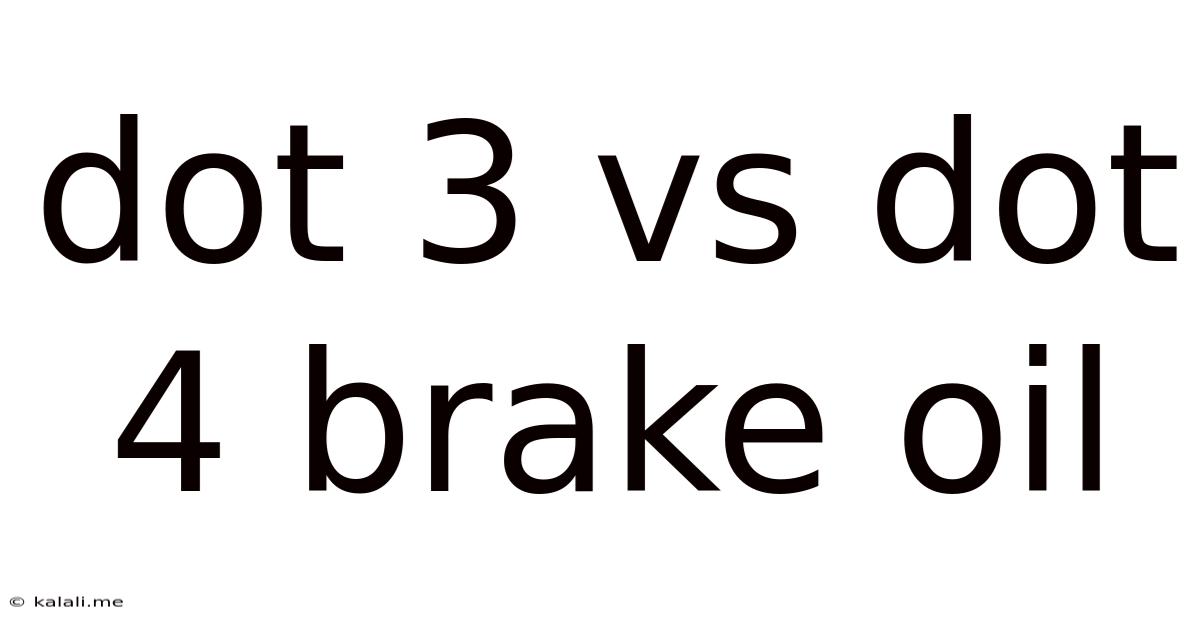Dot 3 Vs Dot 4 Brake Oil
Kalali
Jun 09, 2025 · 3 min read

Table of Contents
DOT 3 vs DOT 4 Brake Fluid: What's the Difference and Which Should You Choose?
Choosing the right brake fluid is crucial for your vehicle's safety and braking performance. Two of the most common types are DOT 3 and DOT 4, but understanding their differences is essential for making the right choice. This article will delve into the key distinctions between DOT 3 and DOT 4 brake fluid, helping you determine which one is best for your car.
What is Brake Fluid and Why Does it Matter?
Brake fluid is the hydraulic fluid that transmits pressure from your brake pedal to the calipers or wheel cylinders, ultimately stopping your vehicle. It's a crucial component of your braking system, and using the incorrect type can lead to brake failure. The different DOT classifications indicate the fluid's boiling point and other key properties. Choosing the right fluid ensures optimal braking performance and safety.
DOT 3 Brake Fluid: The Basics
DOT 3 brake fluid is a glycol-ether based fluid with a lower wet boiling point compared to DOT 4. This means that when moisture is absorbed from the atmosphere (which inevitably happens over time), its boiling point decreases significantly. While sufficient for many vehicles, particularly older models, its lower boiling point presents a potential risk of brake fade under strenuous braking conditions, such as prolonged downhill driving or emergency stops.
- Key Characteristics:
- Lower wet boiling point.
- More susceptible to moisture absorption.
- Generally less expensive than DOT 4.
- Suitable for many older vehicles.
DOT 4 Brake Fluid: Enhanced Performance
DOT 4 brake fluid boasts a higher wet and dry boiling point than DOT 3. This superior heat resistance means it's less prone to vapor lock (the formation of vapor bubbles in the brake lines that reduces braking effectiveness) during high-temperature braking scenarios. Its improved formulation also offers enhanced protection against corrosion.
- Key Characteristics:
- Higher wet and dry boiling point.
- Better resistance to moisture absorption.
- Offers enhanced protection against corrosion.
- Suitable for modern vehicles, high-performance vehicles, and vehicles in demanding climates.
DOT 3 vs DOT 4: A Comparison Table
| Feature | DOT 3 | DOT 4 |
|---|---|---|
| Wet Boiling Point | Lower | Higher |
| Dry Boiling Point | Lower | Higher |
| Moisture Absorption | Higher | Lower |
| Corrosion Resistance | Lower | Higher |
| Cost | Generally Less Expensive | Generally More Expensive |
| Application | Older vehicles | Modern vehicles, high-performance vehicles |
Which Brake Fluid Should You Use?
The best brake fluid for your vehicle is determined by your vehicle's manufacturer's recommendations. Always consult your owner's manual to confirm the specified DOT rating. Using the wrong type of brake fluid can compromise your braking system and create safety hazards.
Important Considerations:
- Never mix different types of brake fluid. Doing so can lead to unpredictable and potentially dangerous results.
- Regularly flush and change your brake fluid. This helps remove moisture and contaminants that can degrade performance and safety. Your owner's manual will provide recommended fluid change intervals.
- Always use brake fluid from a reputable manufacturer. Choosing low-quality brake fluid can negatively impact your braking system's reliability.
By understanding the differences between DOT 3 and DOT 4 brake fluid and adhering to your vehicle's manufacturer guidelines, you can ensure optimal braking performance and prioritize your safety on the road. Remember, your brakes are one of the most critical safety systems in your car – don't compromise on their performance.
Latest Posts
Latest Posts
-
How Many Cups Are In 16 Oz Of Sour Cream
Jul 01, 2025
-
How Many Quarters Are In 20 Dollars
Jul 01, 2025
-
How Many 1 3 Cups Equal A Cup
Jul 01, 2025
-
How Many Hours Are In Two Years
Jul 01, 2025
-
Did You Hear About The Antelope Who Was Getting Dressed
Jul 01, 2025
Related Post
Thank you for visiting our website which covers about Dot 3 Vs Dot 4 Brake Oil . We hope the information provided has been useful to you. Feel free to contact us if you have any questions or need further assistance. See you next time and don't miss to bookmark.